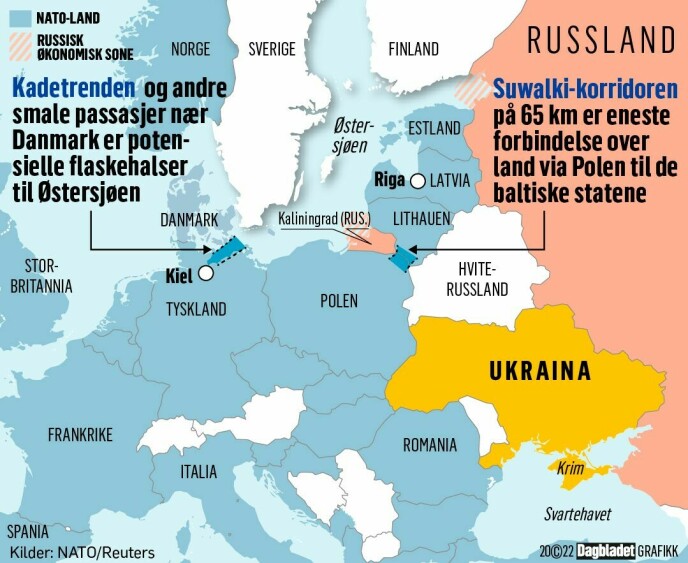When the head of NATO, Jens Stoltenberg, on April 10 announced plans to publish Permanent full force in the EastThe director of the Fridtjof Nansen Institute, Iver Neumann, stated that the most important place that NATO must equip now is the so-called Suwalki gap.
This border area, a narrow 65-kilometer corridor between Lithuania in the north and Poland in the south, separates the NATO Baltic states in the north and other NATO countries in the south, through Belarus in the east and the Russian army heavily. exclave. Kaliningrad In the west.
Tom Rosth, chief of intelligence at the Armed Forces Staff College, also believes it is important for NATO to take action to secure nations in this area.
– This is especially true in the Suwalki region, as the Russians here have their own strategic interests, and because this is one of the few places they can imagine challenging NATO, Røseth tells Dagbladet.
– How weak is this area per noh?
Rosth replies that it is weak as a flat and open land, with no great physical obstacles.
– What makes him less vulnerable, he adds, is that NATO has recently moved soldiers to Poland and the Baltic states.

Now comes the reaction of NATO
– can control
According to him, the fear is that NATO will enter the region too late, if it is occupied by Russia, thus preventing the prospects of supplying the Baltic states with troops above ground.
– Then Russia will be able to quickly control this area, Rosth believes.
“But this has been a concern for NATO for some time now, and it is also the reason why they are increasing their presence in the Baltic states and Poland, that is, to raise the threshold of Russian control and deterrence,” he explains.
The Suwalki Pass itself, which is basically just a flat plain, is pointless to deploy large forces in the current situation, says researcher Røseth.
– It is of great importance to place the forces in the countries so that it is a strategic factor for Russia in its assessment there, so that the Russians realize in the parade launched that it will lead to dire consequences, he said.
medium range missiles
To the west, the Sualki Pass borders Kaliningrad – a region occupied by Russia, which Russian President Vladimir Putin has warned would consider equipping militarily to bolster the country’s security if Finland or Sweden joined NATO.
— There, the Russians stationed, among other things, medium-range missiles, which could carry nuclear warheads — and which could reach all of Europe, says Rosth.
What do you think would happen if Sweden and/or Finland became a member of NATO?
Kaliningrad passed into the Baltic Sea and part of the Baltic Sea balance. If these two neutral states become part of NATO, it is likely that Russia will strengthen its presence and permanently locate its nuclear arsenal there and along the border with Finland.
Rosith is already answering this reply from Moscow, but these are measures that Russia has taken occasionally in the past.

Swalki Pass: A narrow 70-kilometre gorge that makes the Baltic states more vulnerable to a Russian attack.
Show more
– Two new opponents
Last week, Russian Dmitry Medvedev stated that if Sweden and Finland joined NATO, Russia would have two new adversaries, and armament would be necessary, according to the NTB.
– There is no longer any talk of the Baltic Sea region being a nuclear-weapon-free zone. So far, Russia has not taken any action in this regard and has no plans to do so. But if we have to, remember that it wasn’t us who suggested this, the British said independent.
In the coming weeks, both Sweden and Finland will decide whether to apply for NATO membership. If it happens quickly, they can be included in the alliance already at the summit in Madrid at the end of June.
Emergency Parent
According to Rosith, the scenario was discussed on Russian state television in which the area in Kaliningrad was cordoned off by the highway by NATO countries in the Balkans and Poland.
– Then individual politicians believe that Russia is in need and with power can secure its way to Kaliningrad, says Rosth.
In such a scenario, Russia would only be able to reach Kaliningrad by sea, which some Russian politicians believe is not enough to secure the enclave with supplies they consider vital to reach it by land, he explains.
As it stands now, Rosth believes that Russia does not have the ability to challenge NATO countries with conventional weapons.
– Norway helps NATO in the Baltic states with air patrols and presence, and it is important that we and other NATO countries be there. However, I do not see the threat as risky, because Moscow has enough relations with Ukraine for the time being.
Also because the Baltic states and Poland are receiving many threats from Russia now, it is imperative for NATO to make its presence visible in these countries, says researcher Rossith.
“Moscow is banging its swords and trying to intimidate these countries from supporting Ukraine with political and diplomatic pressure – and therefore it is important for NATO to be present militarily, politically and diplomatically,” he said.

“Organizer. Social media geek. General communicator. Bacon scholar. Proud pop culture trailblazer.”

